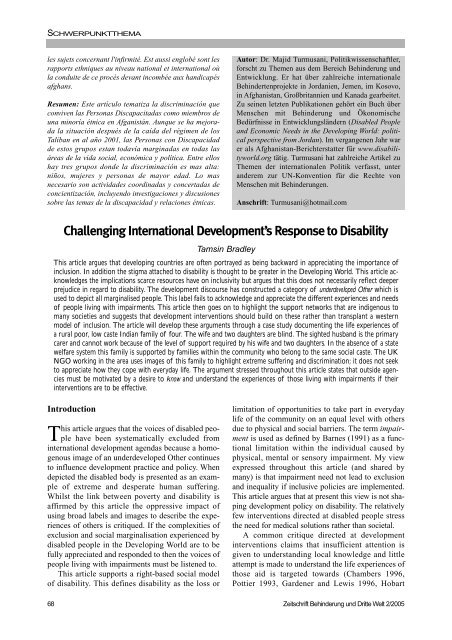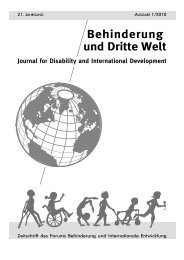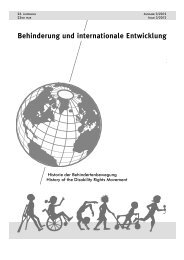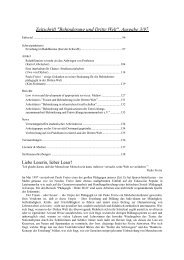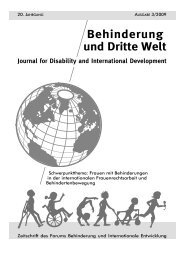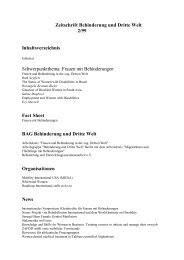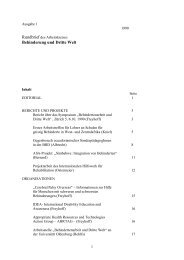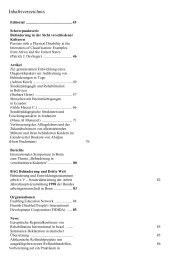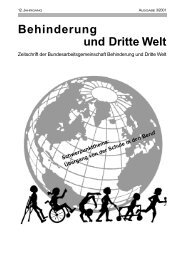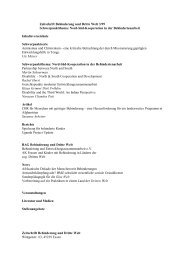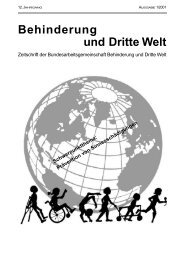Armut und Behinderung - Behinderung und Dritte Welt
Armut und Behinderung - Behinderung und Dritte Welt
Armut und Behinderung - Behinderung und Dritte Welt
Create successful ePaper yourself
Turn your PDF publications into a flip-book with our unique Google optimized e-Paper software.
SCHWERPUNKTTHEMAles sujets concernant l'infirmité. Est aussi englobé sont lesrapports ethniques au niveau national et international oùla conduite de ce procès devant incombée aux handicapésafghans.Resumen: Este artículo tematiza la discriminación queconviven las Personas Discapacitadas como miembros deuna minoría étnica en Afganistán. Aunque se ha mejoradala situación después de la caída del régimen de losTaliban en al año 2001, las Personas con Discapacidadde estos grupos estan todavía marginadas en todas lasáreas de la vida social, económica y política. Entre elloshay tres grupos donde la discriminación es mas alta:niños, mujeres y personas de mayor edad. Lo masnecesario son actividades coordinadas y concertadas deconcientización, incluyendo investigaciones y discusionessobre las temas de la discapacidad y relaciones étnicas.Autor: Dr. Majid Turmusani, Politikwissenschaftler,forscht zu Themen aus dem Bereich <strong>Behinderung</strong> <strong>und</strong>Entwicklung. Er hat über zahlreiche internationaleBehindertenprojekte in Jordanien, Jemen, im Kosovo,in Afghanistan, Großbritannien <strong>und</strong> Kanada gearbeitet.Zu seinen letzten Publikationen gehört ein Buch überMenschen mit <strong>Behinderung</strong> <strong>und</strong> ÖkonomischeBedürfnisse in Entwicklungsländern (Disabled Peopleand Economic Needs in the Developing World: politicalperspective from Jordan). Im vergangenen Jahr warer als Afghanistan-Berichterstatter für www.disabilityworld.orgtätig. Turmusani hat zahlreiche Artikel zuThemen der internationalen Politik verfasst, unteranderem zur UN-Konvention für die Rechte vonMenschen mit <strong>Behinderung</strong>en.Anschrift: Turmusani@hotmail.comChallenging International Development’s Response to DisabilityTamsin BradleyThis article argues that developing countries are often portrayed as being backward in appreciating the importance ofinclusion. In addition the stigma attached to disability is thought to be greater in the Developing World. This article acknowledgesthe implications scarce resources have on inclusivity but argues that this does not necessarily reflect deeperprejudice in regard to disability. The development discourse has constructed a category of <strong>und</strong>erdeveloped Other which isused to depict all marginalised people. This label fails to acknowledge and appreciate the different experiences and needsof people living with impairments. This article then goes on to highlight the support networks that are indigenous tomany societies and suggests that development interventions should build on these rather than transplant a westernmodel of inclusion. The article will develop these arguments through a case study documenting the life experiences ofa rural poor, low caste Indian family of four. The wife and two daughters are blind. The sighted husband is the primarycarer and cannot work because of the level of support required by his wife and two daughters. In the absence of a statewelfare system this family is supported by families within the community who belong to the same social caste. The UKNGO working in the area uses images of this family to highlight extreme suffering and discrimination; it does not seekto appreciate how they cope with everyday life. The argument stressed throughout this article states that outside agenciesmust be motivated by a desire to know and <strong>und</strong>erstand the experiences of those living with impairments if theirinterventions are to be effective.IntroductionThis article argues that the voices of disabled peoplehave been systematically excluded frominternational development agendas because a homogenousimage of an <strong>und</strong>erdeveloped Other continuesto influence development practice and policy. Whendepicted the disabled body is presented as an exampleof extreme and desperate human suffering.Whilst the link between poverty and disability isaffirmed by this article the oppressive impact ofusing broad labels and images to describe the experiencesof others is critiqued. If the complexities ofexclusion and social marginalisation experienced bydisabled people in the Developing World are to befully appreciated and responded to then the voices ofpeople living with impairments must be listened to.This article supports a right-based social modelof disability. This defines disability as the loss orlimitation of opportunities to take part in everydaylife of the community on an equal level with othersdue to physical and social barriers. The term impairmentis used as defined by Barnes (1991) as a functionallimitation within the individual caused byphysical, mental or sensory impairment. My viewexpressed throughout this article (and shared bymany) is that impairment need not lead to exclusionand inequality if inclusive policies are implemented.This article argues that at present this view is not shapingdevelopment policy on disability. The relativelyfew interventions directed at disabled people stressthe need for medical solutions rather than societal.A common critique directed at developmentinterventions claims that insufficient attention isgiven to <strong>und</strong>erstanding local knowledge and littleattempt is made to <strong>und</strong>erstand the life experiences ofthose aid is targeted towards (Chambers 1996,Pottier 1993, Gardener and Lewis 1996, Hobart68Zeitschrift <strong>Behinderung</strong> <strong>und</strong> <strong>Dritte</strong> <strong>Welt</strong> 2/2005


